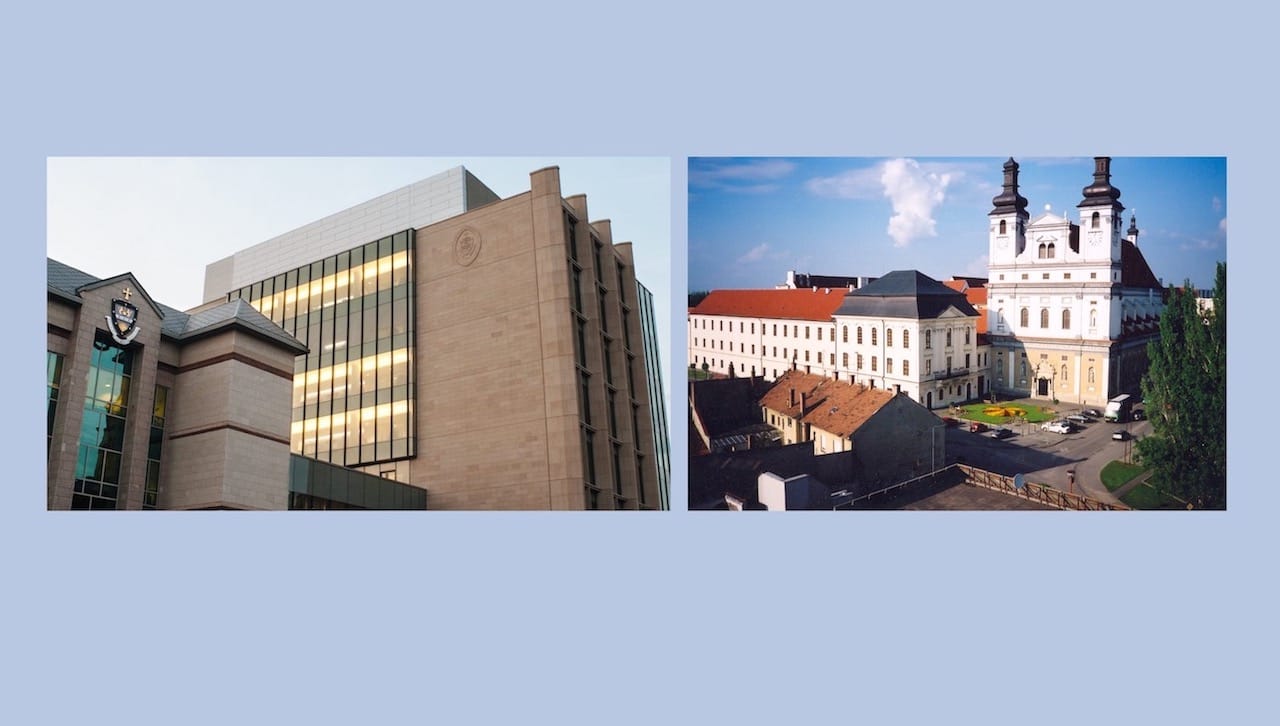25-year-old Partnership Focuses on Global Health

Since 1995, The University of Scranton has engaged in a Health Management Education Partnership with Trnava University in Trnava, Slovakia.
The long-standing partnership between the two Jesuit universities, which in the past has received support from United States Agency for International Development (USAID) and other U.S. funding sources, was recently enhanced by support from an Erasmus+ grant from the European Union. Erasmus+ is the European Union’s program that provides opportunities for over 4 million participants to study, train, gain experience and volunteer abroad and also supports activities with partner countries.
“Our partnership with Trnava University first started when Father Panuska was president of The University of Scranton and U.S. agencies were giving aid to former Soviet Union and Central European countries. The U.S. aid focused on creating programs that were sustainable, and we certainly did that with this partnership,” said Daniel J. West Jr., Ph.D., professor and chair of Scranton’s Department of Health Administration and Human Resources.
“Today, the European Union is providing support to the partnership. This is a continuation in cooperation with a move of support from the U.S. side to the E.U. side,” said Viera Rusnakova, M.D., Ph.D., vice dean for international relations and development at Trnava University and affiliated faculty member for health administration at the University, during a recent visit to Scranton as part of this program.
The Erasmus+ supported project was developed by Trnava University to sustain the long-term cooperation with Scranton and to improve the mobility of teachers to further strengthen the international dimension of the program, especially in research and pedagogical capacities of both partnerships. The project builds on existing cooperation that includes study visits, exchanges of lecturers and students, joint conferences and research publication especially in the area of health administration education and public health and social work.
“The previous 20-plus years of collaboration has had an indisputable impact on the improvement of quality of education at Trnava University and its workplaces, supporting international auditing and providing expertise from the American side of the university, as well as quality assurance at healthcare facilities in Slovakia,” said Martin Rusnak, M.D., Ph.D., professor in the Department of Public Health at Trnava University and affiliated faculty member for health administration at Scranton.
Dr. West said that the program has produced much research that has been disseminated through publications, as well as “by faculty sharing research with students in the classroom, so the international mobility of teachers is a crucial element to the sharing of information.”
“And, the international dimension of health care important component of education and research,” said Dr. Rusnakova.
According to Drs. Rusnakova and Rusnak, Trnava University provides opportunities to address health problems not only in Slovakia, but also in international and global contexts. They explained that the issues addressed cross national borders or have a global political and economic impact. They include improving health (including mental health), reducing health inequalities and protecting against global threats. Attention is paid to the problems of travel medicine, as well as to migration, population aging and chronic diseases, a common response to natural disasters and persistent threats to infectious diseases. Thus, the focus is not just about comparing and identifying differences in health across countries, but rather finding common features in terms of possible collective, partnership-based activities.
“Global health is aimed at citizens around the world, promotes interpersonal understanding and calls for the cultivation of such approaches,” said Dr. Rusnakova.
For the future, the partners are examining executive certificate programs and joint degree possibilities and are looking to develop technologies capable to deliver these programs.






